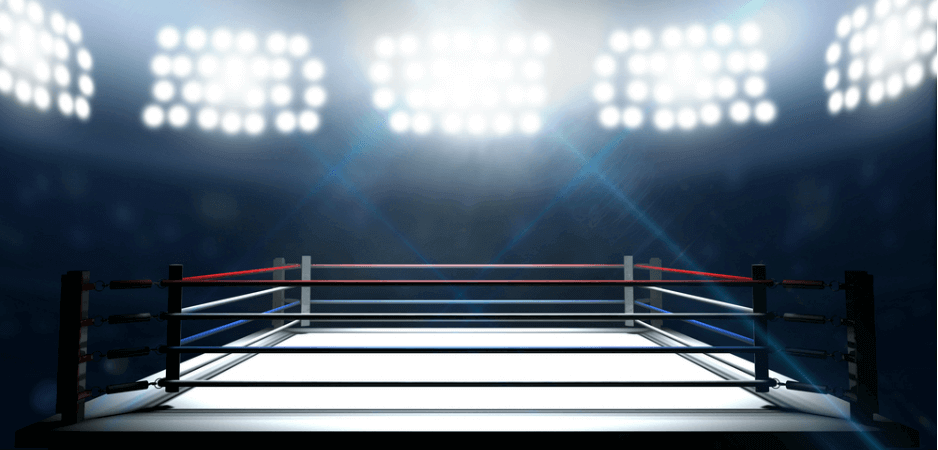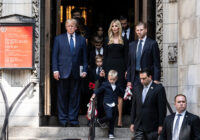The self-styled The Donald appears to approach the performance of the presidential office as a reframing of the professional wrestling industry’s shtick.
Recent attention has turned to how Donald Trump might model aspects of the business of his presidency on that of the multi-million valued American Ultimate Fighting Championship (UFC) industry. There are other significant ways, however, that POTUS might be drawing inspiration from the popular theater fabrications of professionally staged fight productions. The self-styled The Donald appears, in significant ways, to approach the performance of presidential office as a reframing of the professional wrestling industry’s shtick as he appropriates all its knockabout trappings for the 21st-century new media big stage.
According to the French semiologist Roland Barthes, in his essay “The World of Wrestling” in Mythologies, wrestling is one of the “intelligible spectacles” that the public is prepared to accept as an essential and epic presentation of the struggle between good and evil. It displays mythic (and thus untrue) set pieces in which the spectators, while all too aware of the fakery behind the game that is being played out, are nonetheless happy to suspend their disbelief for the duration of the fun ride. Barthes noted “that in America wrestling represents a sort of mythological fight between Good and Evil (of a quasi-political nature).”
Donald Trump is, of course, all too shrewdly aware of how the big bucks wrestling game works its particular brand of smoke and mirrors through his direct involvement with the World Wrestling Entertainment Inc. (WWE). His appetite for the WWE’s peculiar fusion of sport and show business culminated in his direct participation in a televised Battle of the Billionaires with WWE CEO and Trump donor Vince McMahon in 2007.
Trump well understands how the wrestling business thrives on packaging simplistic absolutes and cardboard opposites within a prescriptive series of easily intelligible spectacles — the “heel” versus the “face,” the cheat versus the good guy, the “monster” versus the “jobber” — all wrapped up in a grand scale, stage managed, crowd pleasing showiness. Classic villains, moreover, are usually dressed up as the “other,” like Abdullah the Butcher or The Russian Bear (both, incidentally, Canadians), while heroes are often depicted as local, good ol’ boys or all-Americans (“Hacksaw” Jim Duggan or The Patriot).
The business of wrestling, moreover, relies on taunts, threats, feuds and insults to frame the stories being told, to help whip up the crowd and to get the audience to buy into whatever storyline is being rolled out. Wrestling is a form of manufactured bombast, a model of spiel and spin of which Donald Trump is himself a master.
Trump’s reality TV experiences with The Celebrity Apprentice — interestingly co-produced by Trump’s supposed rival Arnold Schwarzenegger — actually echo wrestling’s highly fictionalized depictions of a mediatized reality in which “the people” are pitted against imagined “foes,” or in which America is, perhaps, afforded a default special, different and mythical status. As in the world of wrestling, fictionalized reality has no place for boring, unadulterated facts, and it manages its effects by trading on polarities and simplistic tropes, heavily edited into stereotypical narratives.
Donald Trump’s presentation of self is as mono-dimensional as the wrestler’s adoption of a mask. He presents the archetypal braggart character, a huckster who is content to play the villainous role. Like Barthes’ salaud wrestler, the president is happy to cry foul after having, himself, gleefully perpetrated some dirty move upon his opponent.
Trump’s core supporters are, in fact, fight fans. They, like him, fully understand the kayfabe — wrestling’s fundamental pretense that what is played out before them is real. The wrestling audience actually knows that what it is rooting for is completely staged but can disregard this as what matters most is how expertly the pretense is put across. The fans understand that the game is all just for effect. This helps to explain the paradox that there is a perceivable gap between Trump’s rhetoric and his political motivations.
Thus Trump’s supposed battle with the opposition press is an instance of fake news writ large. Rather than seriously believing that the media is misreporting his actions, Trump (and his fan base) is more concerned that the kayfabe is in danger of being broken, and that the exposure of what is behind the curtain or underneath the wrestling mask spoils the comforting fun. The illusion has to be maintained at all costs.
Donald Trump cannot accept that the media (whose own creation he is) is not always complicit with him in its exposure of the same types of fakery, fictionalized realities and myth-making he indulges in that the media, in turn, is also in the business of perpetrating. For others, evidence that the president’s cries of foul play are an attempt at a fake manipulation by the faker-in-chief, provides a deliciously irony.
As Barthes says of wrestling: “The public is completely uninterested in knowing whether the contest is rigged or not, and rightly so; it abandons itself to the primary virtue of the spectacle, which is to abolish all motives and all consequences: what matters is not what it thinks but what it sees.” For as long as that illusion holds, Donald Trump will remain the ultimate champion.
The views expressed in this article are the author’s own and do not necessarily reflect Fair Observer’s editorial policy.
Support Fair Observer
We rely on your support for our independence, diversity and quality.
For more than 10 years, Fair Observer has been free, fair and independent. No billionaire owns us, no advertisers control us. We are a reader-supported nonprofit. Unlike many other publications, we keep our content free for readers regardless of where they live or whether they can afford to pay. We have no paywalls and no ads.
In the post-truth era of fake news, echo chambers and filter bubbles, we publish a plurality of perspectives from around the world. Anyone can publish with us, but everyone goes through a rigorous editorial process. So, you get fact-checked, well-reasoned content instead of noise.
We publish 2,500+ voices from 90+ countries. We also conduct education and training programs
on subjects ranging from digital media and journalism to writing and critical thinking. This
doesn’t come cheap. Servers, editors, trainers and web developers cost
money.
Please consider supporting us on a regular basis as a recurring donor or a
sustaining member.
Will you support FO’s journalism?
We rely on your support for our independence, diversity and quality.






